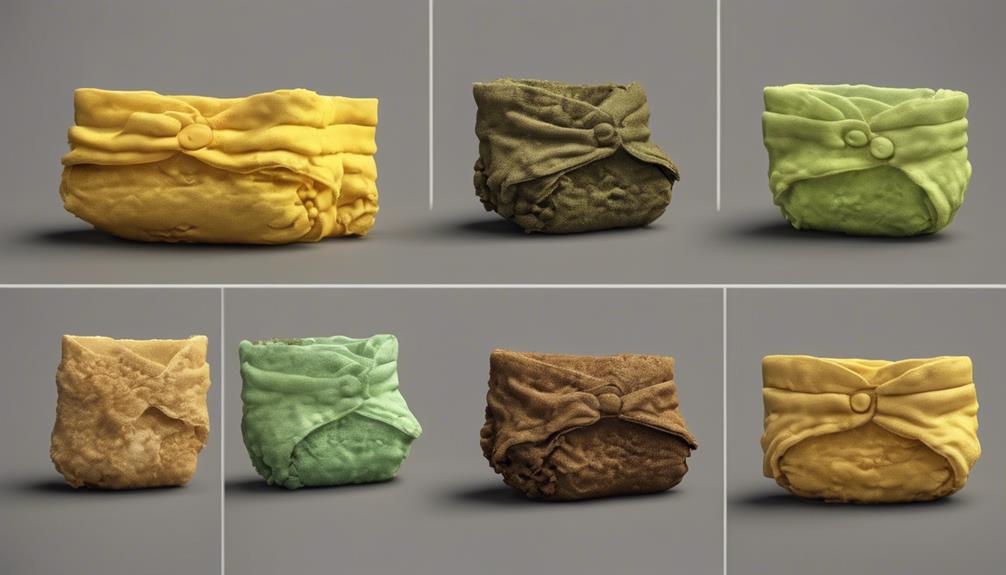When my little one was born, I was told that newborn poop is like a daily report card on their health. But how often should my newborn poop? Well, let's just say it's a question that can keep us parents guessing.
From mustard-yellow seedy poops to surprise explosions, the frequency and consistency can be quite the topic of discussion. But don't worry, we are here to provide you with some essential insights to navigate this messy yet crucial aspect of your baby's well-being.
Key Takeaways
- Breastfed babies can poop up to 6 times a day, while formula-fed newborns typically have 1-4 bowel movements daily.
- Poop consistency can vary from runny to paste-like, with meconium being sticky and dark.
- Normal newborn poop colors range from yellow to green to brown, indicating a healthy digestive system.
- Seek medical advice if there is no poop in 4 days, blood is present, or signs of dehydration or constipation arise.
Newborn Poop Frequency
Newborns' poop frequency can vary greatly based on whether they're breastfed or formula-fed. Breastfed babies often have more frequent bowel movements, sometimes after each nursing session, totaling up to six or more poops daily in their early weeks. On the other hand, formula-fed newborns typically have 1-4 bowel movements a day, with larger stools but less frequent compared to breastfed infants. It's normal for stool consistency to vary, ranging from multiple times a day to once a week. Additionally, the color of poop can range from yellow to green to brown, with the first stool, known as meconium, being dark and sticky.
As newborns develop, they undergo changes in their poop frequency and characteristics. Understanding these patterns can provide valuable insights into their overall health and well-being. Parents play a vital role in observing and monitoring their baby's bowel movements, seeking guidance from healthcare providers when necessary to make sure their little one's growth and development are on track.
Poop Color and Appearance

When observing a newborn's poop color and appearance, it serves as an important indicator of their digestive health and overall well-being.
Meconium, the initial bowel movement, is dark greenish-black and sticky. Breastfed babies usually have mustard-yellow, seedy poop, while formula-fed infants pass yellow-tan, paste-like stools.
Any significant changes in poop color, such as red, black, white, or grey, could signal underlying health issues requiring attention. Normal variations in newborn poop include shades of yellow, green, and brown, reflecting the baby's diet and digestive process.
Monitoring these variations is vital for early identification of any potential health concerns. By staying attentive to your baby's poop color and appearance, you can play a proactive role in maintaining their well-being and ensuring their digestive system functions optimally.
Breastfed Vs. Formula-Fed Poop
Observing the difference in poop frequency and characteristics between breastfed and formula-fed babies offers valuable insights into their feeding patterns and overall health status.
- Breastfed baby poop is typically more frequent, with up to 6 or more bowel movements a day in the first few weeks.
- Formula-fed babies tend to have fewer but larger stools, usually ranging from 1-4 bowel movements per day.
- Breastfed baby poop is mustard-yellow in color, while formula-fed baby poop is tan or yellow.
Understanding these distinctions can help parents track their baby's bowel movements effectively, providing essential information about their feeding routines and health conditions. Breastfed babies often have more frequent, seedy, and loose stools, indicating the efficiency of their digestion and nutrient absorption. On the other hand, formula-fed infants tend to produce fewer, firmer, and paste-like stools due to the composition of formula milk. By recognizing these variations, parents can better comprehend their newborn's unique needs and respond promptly to any deviations from the expected patterns.
Signs of Healthy Poop

Determining the signs of healthy poop in infants is essential for monitoring their well-being and development. In newborns, poop colors can vary depending on whether they're breastfed or formula-fed. Breastfed babies typically have mustard-yellow stool, while formula-fed infants tend to have tan or yellow poop. The normal consistency of healthy newborn poop is soft, runny, and seedy. It's essential to highlight that meconium, the first stool passed by babies, is thick, sticky, and greenish-black, usually occurring in the first 24-48 hours after birth.
Monitoring your baby's poop frequency, color, and consistency is critical as changes in these aspects can indicate underlying health issues. If you notice any concerning changes in your newborn's poop, consulting a pediatrician for proper guidance and monitoring is advisable.
Regularly observing and understanding the signs of healthy poop can help you safeguard your baby's well-being and detect any potential issues early on.
When to Seek Medical Advice
After recognizing signs of healthy poop in your newborn, it's important to be aware of when seeking medical advice becomes necessary. Here are some key points to think about:
- Contact a healthcare provider if your newborn hasn't pooped in 4 days to rule out constipation.
- Immediate attention is needed if you notice blood in your newborn's stool.
- Signs of dehydration in a newborn should be promptly addressed by seeking medical advice.
If you observe any symptoms of constipation or notice abnormal stool patterns, it's critical to discuss these concerns with a pediatrician. Trust your parental instincts; if you feel uneasy about your newborn's poop or overall well-being, don't hesitate to seek medical help.
Your pediatrician is there to support you and your baby's health, so reaching out for guidance when in doubt is always a wise decision. Your proactive approach to addressing any potential issues with your newborn's poop can help safeguard their well-being and comfort.
Frequently Asked Questions
How Often Should a Newborn Poop Chart?
We suggest monitoring your newborn's poop frequency to track their digestive health. Changes should be shared with your pediatrician promptly. It's crucial for ensuring your baby's well-being and feeding adequacy.
How Often Should You Check a Newborn's Poop?
We should check a newborn's poop consistency, color, and frequency daily. Changes can signal digestive issues or health concerns. If worried, consulting the pediatrician is wise. Monitoring their poop helps us understand their health better.
How Often Should a Newborn Have a Poopy Diaper?
We comprehend the concern. Newborns vary, but pooping 3-4 times a day is common. Keep an eye on consistency. Consult a pediatrician if worried. Trust your instincts, and remember, we're here to help.
How Long Can Newborn Go Without Pooping?
We comprehend your concern about how long a newborn can go without pooping. It's crucial to emphasize that newborns may go up to 4 days without pooping, but contact your pediatrician if you have any worries.
Conclusion
To sum up, understanding your newborn's poop frequency and appearance is essential for monitoring their health. Remember to keep an eye on wet diapers and variations in poop color. If you have any concerns or notice changes, don't hesitate to reach out to your pediatrician for guidance.
How well do you know your baby's poop patterns?









